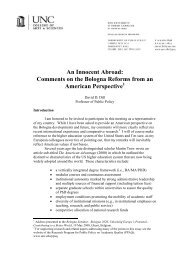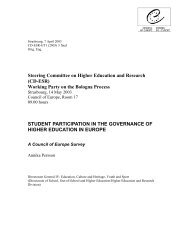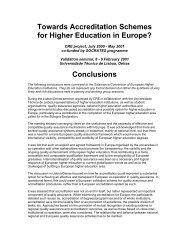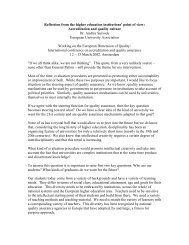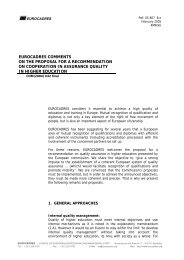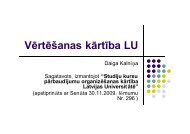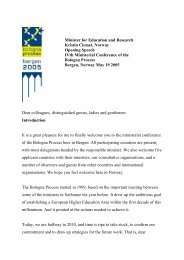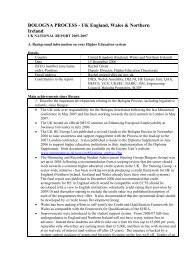EUA Survey Of Master Degrees In Europe - European University ...
EUA Survey Of Master Degrees In Europe - European University ...
EUA Survey Of Master Degrees In Europe - European University ...
You also want an ePaper? Increase the reach of your titles
YUMPU automatically turns print PDFs into web optimized ePapers that Google loves.
10The <strong>Master</strong> marketGlobal economic crisisSuch trends as are observable have now to be set against the backdrop of the severe globaldownturn. Recession will impact in unpredictable ways and short-term changes will intrude onthe more gradual evolution of the Bologna Process towards the EHEA. Just how the <strong>Master</strong> will beaffected is uncertain. Journalistic speculation has focused primarily on the business and managementstudies sector, and on the UK situation in particular, both because here the banking crisis is moresevere than elsewhere, and because second cycle course delivery is more susceptible to competitivepressures.Reports in the British specialist press suggested that applications to <strong>Master</strong> courses were holdingsteady in the autumn of 2008. Whether by the autumn of 2009 prospective students will still havethe necessary disposable capital or access to private loans, as well as the non-aversion to risk, isimpossible to say. Some sources predict a flight into public sector employment, and into teaching inparticular. Others assume that entry to <strong>Master</strong> programmes will rise as students delay their exposureto a problematic labour market. The Financial Times reported a shift of consumer interest from theMBA to the pre-experience <strong>Master</strong> in Management, noting the global expansion of the Communityof <strong>Europe</strong>an Management Schools [CEMS]. Shifts in market share of this sort – from MBA to <strong>Master</strong>in Management – are, arguably, precisely the sort of contingencies to which established businessschools, operating in established marketplaces, can easily adjust.Students responding to the <strong>EUA</strong> on-line questionnaire were asked to give the most important reasonfor undertaking a <strong>Master</strong> programme. 48% cited preparation for the labour market; 30% said thatthey wished to complete the first cycle with a more specialised course; 15% intended to prepare forthe doctorate. This was before the extent of the crisis had become apparent. Now, it is evident thatrecession will also bring in its train all kinds of high-skill retraining needs, as companies consolidateand re-focus, as well as a demand for similar provision from newly unemployed workers.<strong>In</strong> this context, agencies such as UK’s HEFCE will play a major role in seeking new forms of HEenterprisecollaboration and reconfiguring the workforce. HEFCE has set up an Economic Challenge<strong>In</strong>vestment Fund, which builds on previous knowledge transfer initiatives. <strong>In</strong>stitutions biddingfor matched funding will have an opportunity, perhaps as never before, to reshape <strong>Master</strong>-levelprovision in a lifelong learning perspective.Recession will test the skills forecasting capacity of public authorities and the elasticity of EU stateaid rules for education and training. <strong>In</strong> late 2008, the <strong>Europe</strong>an Commission estimated that ‘in EU25, between 2006 and 2020, the proportion of jobs requiring high levels of education attainmentshould rise from 25.1% to 31.3% of the total’. The figure, derived from CEDEFOP data which doesnot disaggregate ISCED levels 5 and 6, may already be in need of revision.More importantly for the HE sector, recession will challenge the resources of institutions which, forlegal or academic reasons, lack the autonomy, the strategic vision and the operational flexibility torespond. Those on which the Bologna template has been imposed by legislation may well requirefocused capacity building, if they are to turn its schematic features into creative strategies andversatile delivery systems.National responses will be critical. Early indications are that HE budgets will be cut in Hungary,Italy, Latvia, Lithuania and Poland, while better insulated countries (Denmark, France, Germany,Switzerland) will increase expenditure on HE as part of national stimulus packages. The <strong>Master</strong>market will also be impacted by reductions in outflows from sending countries, as purchasing powerdiminishes and as the expansion of national HE systems accelerates. The UK market will benefit fromthe depreciation of sterling.64




